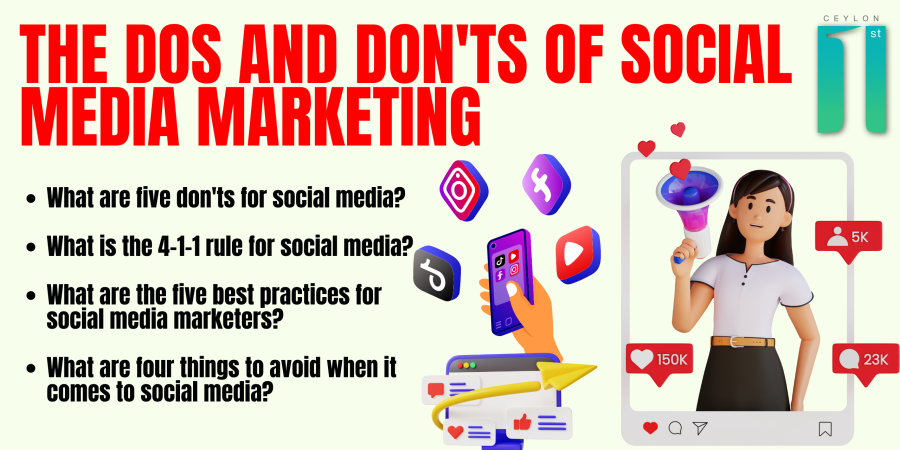Social media marketing has become an essential tool for businesses to connect with their target audience, build brand awareness, and drive sales. To ensure effective and successful social media marketing campaigns, it’s important to follow certain dos and avoid common pitfalls.
Here are some dos and don’ts of social media marketing:
Dos of Social Media Marketing:
- Set Clear Goals: Define your objectives and establish measurable goals for your social media marketing efforts. Whether it’s increasing brand awareness, driving website traffic, or generating leads, clear goals will guide your strategy.
- Understand Your Audience: Conduct thorough research to understand your target audience’s preferences, demographics, and behavior on social media. This knowledge will help you create relevant and engaging content that resonates with them.
- Develop a Strategy: Create a comprehensive social media marketing strategy that outlines the platforms you’ll use, the type of content you’ll share, and the frequency of your posts. Having a plan in place will keep your efforts focused and consistent.
- Provide Value: Focus on providing valuable content that educates, entertains, or solves problems for your audience. This builds trust, credibility, and fosters engagement with your brand.
- Engage and Interact: Actively engage with your followers by responding to comments, messages, and mentions. Encourage conversations, ask questions, and show genuine interest in your audience’s opinions. This fosters a sense of community and strengthens relationships.
- Use Visual Content: Visuals such as images, videos, and infographics tend to perform better on social media. Incorporate eye-catching visuals into your posts to grab attention and increase engagement.
- Test and Analyse: Regularly test different types of content, posting times, and messaging to understand what resonates best with your audience. Use social media analytics tools to track metrics and gain insights into the effectiveness of your campaigns.
Don’ts of Social Media Marketing:
- Neglect Consistency: Inconsistency in posting frequency or content style can confuse your audience and weaken your brand’s presence. Maintain a consistent posting schedule and brand voice across all your social media platforms.
- Over-Promote: Avoid constantly bombarding your followers with promotional content. Instead, strike a balance between promotional and non-promotional posts. Focus on building relationships and providing value before making sales pitches.
- Ignore Negative Feedback: Address negative comments or feedback promptly and professionally. Ignoring or deleting negative feedback can damage your brand’s reputation. Responding in a positive and helpful manner shows that you value your customers’ opinions and are willing to address their concerns.
- Misuse Hashtags: While hashtags can increase your reach and visibility, it’s important to use them strategically and sparingly. Avoid using irrelevant or excessive hashtags that can make your posts look spammy or confusing.
- Disregard Platform-Specific Features: Different social media platforms have unique features and algorithms. Tailor your content to each platform’s strengths and take advantage of specific features like Stories on Instagram or LinkedIn Pulse articles.
- Forget to Monitor Competitors: Keep an eye on your competitors’ social media activities to gain insights and identify opportunities. Analyze their strategies, content, and engagement levels to refine your own approach.
- Neglect Analytics: Regularly analyze your social media analytics to understand which tactics are working and which aren’t. This data will help you make informed decisions, optimize your campaigns, and achieve better results over time.
Remember, social media marketing is an ongoing process that requires consistent effort, adaptation, and experimentation. By following these dos and avoiding the don’ts, you can effectively leverage social media to grow your brand and engage with your target audience.
What are 5 don’ts for social media?
Certainly! Here are five important don’ts for social media marketing:
- Don’t Overlook the Importance of Planning: Avoid jumping into social media marketing without a solid plan in place. Random or sporadic posting can confuse your audience and dilute your brand’s messaging. Take the time to develop a comprehensive strategy that aligns with your goals.
- Don’t Engage in Controversial or Offensive Discussions: It’s crucial to maintain a professional and respectful tone on social media. Avoid engaging in controversial or offensive discussions that can harm your brand’s reputation. Stay away from sensitive topics that can alienate or offend your audience.
- Don’t Ignore Negative Feedback or Complaints: Negative comments or complaints are inevitable on social media. Ignoring or deleting them can create a negative perception of your brand. Instead, address negative feedback promptly and constructively. Show empathy, offer solutions, and demonstrate your commitment to customer satisfaction.
- Don’t Automate Everything: While automation tools can be helpful, don’t rely solely on them. Avoid automating every aspect of your social media presence, as it can come across as impersonal and robotic. Maintain a balance between automation and genuine human interaction to foster meaningful connections with your audience.
- Don’t Neglect Social Media Monitoring: It’s essential to monitor your brand mentions, comments, and messages on social media. Ignoring or delaying responses can lead to missed opportunities or potential crises. Regularly monitor your social media platforms to promptly engage with your audience and address any issues that arise.
By avoiding these common pitfalls, you can ensure a more successful and effective social media marketing strategy.
What is the 4-1-1 rule social media?
The “4-1-1 rule” is a guideline often used in social media marketing to maintain a balanced approach to content sharing. It suggests that for every six social media posts you share, four should be valuable and relevant content from external sources, one should be your original content, and one should be a promotional or sales-related post.
Here’s a breakdown of the rule:
- Four Valuable and Relevant Posts: These posts should provide valuable information, insights, or resources to your audience. They can include curated content from trusted sources in your industry or niche, such as articles, blog posts, infographics, videos, or relevant news updates. The goal is to position yourself as a helpful resource by sharing content that your audience will find interesting and informative.
- One Original Content Post: This post should be your own unique and original content. It can be a blog post, a video, an infographic, or any other form of content that showcases your expertise and adds value to your audience. This helps establish your brand as a thought leader and allows you to showcase your unique perspective or offerings.
- One Promotional Post: This post is an opportunity to promote your products, services, or any upcoming events or offers. However, it’s important to strike a balance and avoid overwhelming your audience with constant promotional messages. Make sure to craft your promotional post in a way that adds value and focuses on the benefits or solutions you provide.
The 4-1-1 rule is a flexible guideline and can be adapted to suit your specific social media strategy and audience preferences. It aims to ensure that your social media presence is not solely focused on self-promotion but also provides value and engagement, which is essential for building trust, credibility, and a loyal following.
What are the 5 best practices for a social media marketer?
Here are five key best practices for social media marketers:
- Clearly Define Your Objectives: Start by setting clear and specific goals for your social media marketing efforts. Whether it’s increasing brand awareness, driving website traffic, generating leads, or improving customer engagement, having well-defined objectives will guide your strategy and help you measure success.
- Know Your Target Audience: Understanding your target audience is crucial for effective social media marketing. Conduct thorough research to identify their demographics, interests, preferences, and online behaviors. This knowledge will enable you to create content that resonates with them and tailor your messaging to their needs.
- Create Engaging and Valuable Content: Social media is a crowded space, so it’s important to create content that stands out. Focus on producing engaging, informative, and visually appealing content that captures attention and provides value to your audience. Mix up your content formats, such as images, videos, infographics, and live streams, to keep it fresh and varied.
- Consistency and Regularity: Maintaining a consistent presence on social media is crucial. Establish a regular posting schedule that aligns with your audience’s preferences and platform algorithms. Consistency helps build brand awareness, fosters audience engagement, and shows reliability. Utilize scheduling tools to plan and automate your posts while maintaining a human touch.
- Monitor and Analyse Performance: Regularly monitor and analyze your social media performance using analytics tools. Track important metrics such as reach, engagement, click-through rates, conversions, and audience demographics. Analyzing these insights will help you understand what’s working and what needs improvement, allowing you to refine your strategy and optimize future campaigns.
Bonus Best Practice: Foster Genuine Engagement: Social media is not just a one-way communication channel. Encourage meaningful interactions with your audience by responding to comments, messages, and mentions in a timely and personalized manner. Actively engage in conversations, ask questions, and show appreciation for your followers. Building a genuine connection with your audience fosters loyalty, advocacy, and positive word-of-mouth.
By incorporating these best practices into your social media marketing strategy, you can effectively engage your audience, achieve your goals, and maximise the impact of your social media efforts.
What are four things not to do when it comes to social media?
Here are four important things to avoid when it comes to social media marketing:
- Don’t Neglect Planning and Strategy: Avoid jumping into social media marketing without a well-thought-out plan and strategy. Failing to plan can lead to inconsistency, lack of direction, and ineffective messaging. Take the time to develop a comprehensive strategy that aligns with your goals, target audience, and platform-specific best practices.
- Don’t Engage in Controversial or Offensive Behavior: It’s crucial to maintain a professional and respectful tone on social media. Avoid engaging in controversial discussions, making offensive remarks, or posting inappropriate content. Such behavior can quickly damage your brand’s reputation and alienate your audience. Always exercise caution and ensure your content aligns with your brand values.
- Don’t Ignore or Delete Negative Feedback: Negative comments or feedback are bound to happen on social media. Ignoring or deleting them can give the impression that you don’t care about your audience’s concerns. Instead, address negative feedback promptly and professionally. Respond with empathy, seek to understand the issue, and offer solutions or alternatives. This shows that you value your customers and are committed to their satisfaction.
- Don’t Overwhelm with Promotional Content: Social media is not just a platform for constant self-promotion. Avoid overwhelming your audience with excessive promotional content. Instead, focus on providing value, building relationships, and fostering engagement. Strike a balance between promotional and non-promotional posts. Share educational content, industry insights, user-generated content, or entertaining material that resonates with your audience. This approach helps build trust and credibility before making sales pitches.
By avoiding these common pitfalls, you can enhance your social media marketing efforts and maintain a positive brand presence online. Remember to be thoughtful, respectful, and focused on providing value to your audience.
CEYLON FIRST



Leave feedback about this